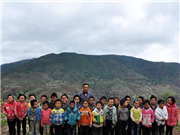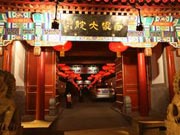

 |
| Germany's Chancellor Angela Merkel (4th L) and Japan's Prime Minister Shinzo Abe (not pictured) take part in a meeting with German and Japanese business leaders in Tokyo, Japan, March 9, 2015. (Xinhua/Ma Ping) |
BEIJING, March 10 -- As the 70th anniversary of the end of World War II (WWII) draws near, Japanhas recently received both straight-forward and implied admonishments for its failure in seriously reflecting on wartime history.
While answering the question of a Japanese reporter at a press conference here on Sunday, Chinese Foreign Minister Wang Yi urged Japan to abandon any attempt to dilute the nation's guilt for its wartime atrocities.
"Seventy years ago, Japan lost the war. Seventy years afterwards, Japan must not lose its conscience," Wang cautioned.
A day later in Tokyo, visiting German Chancellor Angela Merkelmade less stinging remarks but to the same effect when she said her country has won forgiveness from its European neighbors over Nazi Germany's role in WWII "first because Germany did face its past squarely."
This year marks the 70th anniversary of the victory of both the Chinese People's War of Resistance Against Japanese Aggression and the world's anti-Fascist war. Under such circumstances, whether Japan could really express deep remorse for wartime crimes and draw lessons from history will be the focus of the world attention.
But unfortunately, Japanese Prime Minister Shinzo Abehas shown an inclination to dial down national remorse over the war, following various eyebrow-raising remarks in recent weeks.
During his political career, Abe has made repeated attempts to whitewash Japan's history of aggression.
In 1995, as a new member of the House of Representatives, Abe absented himself from the vote on a draft resolution regarding the 50th anniversary of the war, saying he was opposed to the wording in the document such as "colonial rule" and "invasion." Earlier, as a key member of a conservative lawmakers' organization, Abe managed to delete expressions like "apology","never to engage in war" from the draft.
The resolution was passed and later became the basis of the Murayama Statement, a landmark war-repentant statement by post-war Japan.
Coinciding with the issuance of the statement by then Prime Minister Tomiichi Murayama, "Great East Asia War," a book fraught with distortions of historical facts, was published by the right-wing group "History Review Committee" with Abe as a key member.
In 2005, Japan's Diet adopted a resolution marking the 60th anniversary of the end of the war. There were no such words as "colonial rule" and "invasion" in the document, but Abe, then acting secretary general of the LDP, rejected it nevertheless for "inheriting" the decade-old war-related resolution.
Since he took office as Japan's prime minister for the second time in 2012, Abe has made various controversial remarks regarding Japan's aggression during the WWII, and paid homage to the Yasukuni Shrine in defiance of protests by neighboring countries.
Most recently, he revealed the intention to replace the Murayama Statement with his own.
Abe's revisionist tendency prompted concern that the so-called Abe Statement could be a further distortion of history.
In apparent efforts to address such concern from both home and abroad, Abe said on different occasions that he will "inherit the Murayama Statement in general" but not be confined to using the exact same wording.
No matter how skillful Abe will be in touting "peace", "development" and "contribution" in his statement, the document is nothing but a historical revisionist manifesto if it lacks such key words as "colonial rule" and "invasion."
Historical issues have been haunting Japan's relations with China and other Asian countries that suffered from Japan's war of aggression and colonial rule.
Whether to "carry the burden of history, or make a clean break with its past," as the Chinese foreign minister put it, the choice is Japan's.
Day|Week

 Tsinghua junior makes over 10,000 yuan a day by selling alumnae's used quilts
Tsinghua junior makes over 10,000 yuan a day by selling alumnae's used quilts Graduation photos of students from Zhongnan University
Graduation photos of students from Zhongnan University A school with only one teacher in deep mountains
A school with only one teacher in deep mountains Glimpse of cultural heritage "Xilankapu"
Glimpse of cultural heritage "Xilankapu" Homemade cured hams in SW China
Homemade cured hams in SW China Breathtaking buildings of W. Sichuan Plateau
Breathtaking buildings of W. Sichuan Plateau Graduation photos of "legal beauties"
Graduation photos of "legal beauties" Top 10 most expensive restaurants in Beijing in 2015
Top 10 most expensive restaurants in Beijing in 2015